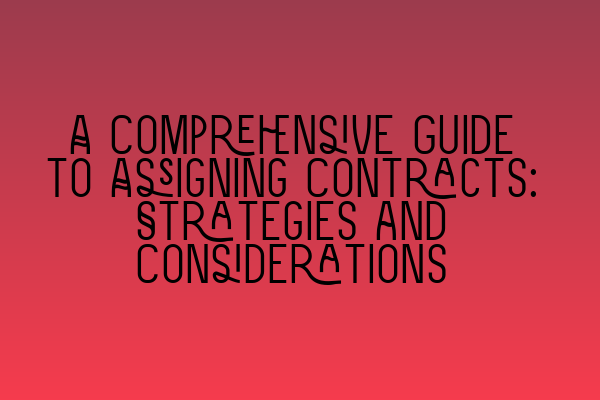A Comprehensive Guide to Assigning Contracts: Strategies and Considerations
Are you considering assigning a contract? Perhaps you’ve entered into a contract and now find that you need to transfer your rights and obligations to another party. Assigning contracts can be a complex process, but with the right strategies and considerations, you can navigate the process effectively.
In this comprehensive guide, we will explore the key strategies and considerations involved in assigning contracts. Whether you are a business owner, a freelancer, or a legal professional, understanding the ins and outs of contract assignment is essential to protect your interests.
What is Contract Assignment?
Before we dive into the strategies and considerations, let’s start with the basics. Contract assignment, also known as contract transfer, is the process of transferring rights and obligations under a contract from one party (the assignor) to another party (the assignee). This transfer can occur with or without the consent of the other party involved in the contract.
Strategies for Successful Contract Assignment
1. Review the Contract Terms: The first and foremost strategy is to thoroughly review the terms of the contract. This includes understanding whether the contract allows for assignment and any specific conditions or limitations on assignment outlined in the agreement. Pay close attention to any clauses that may prohibit or restrict assignment.
2. Obtain Consent from the Other Party: Even if the contract does not explicitly require consent for assignment, it is often wise to seek the consent of the other party involved. This not only ensures a smoother transition but also helps maintain a positive business relationship. If the contract explicitly requires consent, make sure to obtain it in writing.
3. Conduct Due Diligence: Before assigning a contract, conduct due diligence on the assignee. This involves assessing their financial stability, reputation, and ability to fulfill the obligations outlined in the contract. You want to ensure that the assignee is capable of fulfilling their responsibilities.
4. Formalize the Assignment: To legally transfer the rights and obligations of a contract, it is crucial to formalize the assignment. This typically involves drafting an assignment agreement or a novation agreement. These documents outline the details of the assignment, including the parties involved, the rights and obligations being transferred, and any consideration involved.
Considerations for Contract Assignment
1. Liability Protection: When assigning a contract, it is important to consider how liability will be handled. Clarify whether the assignor will remain liable for any breach of contract by the assignee or if the assignee assumes all liability. This is particularly important to protect yourself from potential legal disputes in the future.
2. Confidentiality and Non-Disclosure: If the contract involves sensitive or proprietary information, ensure that the assignee is bound by the same confidentiality and non-disclosure obligations as the assignor. Create a separate agreement or include these provisions in the assignment agreement to safeguard your confidential information.
3. Notice Requirements: Many contracts require that any assignment or transfer of the contract be accompanied by written notice to the other party. Be aware of any notice requirements outlined in the contract and ensure that you comply with them to avoid any potential disputes or claims of breach.
4. Governing Law and Jurisdiction: Consider the governing law and jurisdiction provisions in the contract. If the contract specifies a particular jurisdiction for dispute resolution, ensure that the assignee is aware of and agrees to be bound by these provisions. This will help avoid any conflicts or confusion in the future.
Conclusion
Assigning contracts can be a beneficial strategy for businesses and individuals alike. By following the strategies outlined in this comprehensive guide and considering the key factors involved in the process, you can navigate the world of contract assignment with confidence.
Remember, thorough review and understanding of the contract terms, obtaining consent, conducting due diligence, and formalizing the assignment are all crucial steps in ensuring a successful contract assignment. Additionally, considering liability protection, confidentiality and non-disclosure obligations, notice requirements, and governing law and jurisdiction provisions will help mitigate any potential risks and protect your interests.
If you found this guide helpful, you may also be interested in our related articles on SQE 1 Practice Exam Questions, SQE 1 Practice Mocks FLK1 FLK2, SQE 2 Preparation Courses, SQE 1 Preparation Courses, and SRA SQE Exam Dates. These articles provide valuable information and resources to help you prepare for your legal exams and excel in your legal career.
At SQE Contract Law, we understand the complexities of contract assignment and are here to assist you every step of the way. Our team of expert solicitors can provide professional advice, draft assignment agreements, and help you navigate the legal intricacies involved in assigning contracts. Contact us today to discuss your specific needs and requirements.
